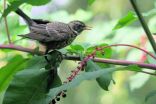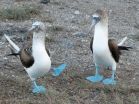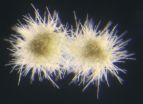INFORMATION:
The paper was published in Nature Scientific Reports Wednesday (April 22) and is available at http://www.nature.com/srep/2015/150409/srep09281/full/srep09281.html.
Funding for the research was provided by the National Institutes of Health, the National Cancer Institute's Cancer Prevention Internship Program and the Indiana Clinical and Translational Sciences Institute.
Study illuminates role of cancer drug decitabine in repairing damaged cells
2015-04-22
(Press-News.org) WEST LAFAYETTE, Ind. - A Purdue University study sheds light on how cell damage is reversed by the cancer drug decitabine and identifies a potential biomarker that could indicate a patient's stage of cancer and response to treatment.
A team led by Joseph Irudayaraj, professor of agricultural and biological engineering, showed that decitabine combats some of the effects of cancer by taking the place of the nucleotide cytosine at specific locations on a replicating DNA strand. By mimicking cytosine, the drug helps "tame" cancerous cells by turning on tumor suppressor genes and turning off oncogenes, genes that can cause a normal cell to become cancerous.
The team also found that decitabine causes an unexpected boost in the amount of a molecule known as 5-hydroxymethylcytosine, or 5hmC. Because many types of cancer cause 5hmC levels to plummet, an uptick in 5hmC could be a sign that cancer treatments are working.
"We think that the expression of 5hmC could be used as a biomarker to define the stage or the aggressiveness of cancer and to possibly indicate the effectiveness of cancer treatment," Irudayaraj said. "This could help us monitor the clinical success of patients receiving decitabine."
Historically, cancer has been linked to mutations and errors in the genome. But in the last few decades, research has shown that cancer also has significant impacts on the epigenome, the collection of chemical compounds that direct which genes are expressed and when. While each cell in your body contains your entire genetic code, an epigenetic process called methylation determines how a cell functions - for example, activating the necessary genes to differentiate a skin cell from an eye cell.
Cancer, however, can hijack the methylation patterns passed down from cell to cell, switching off genes that suppress the formation of tumors and activating genes that instruct the cell to rapidly divide without differentiating. Tumors can result - masses of cells that perform no useful functions in the body.
Decitabine, one of the first epigenetic drugs, helps reverse the altered methylation patterns in cancerous cells, but its precise mode of action has not been known. Using a combination of models, Irudayaraj and his fellow researchers hypothesized that decitabine is taking the place of cytosine at strategic positions on replicating strands of DNA in cancer cells.
When an enzyme tries to add a methyl group to silence decitabine - following the cancer-dictated patterns - the drug traps it in place, preventing methylation. This triggers another group of enzymes to transform a methylated cytosine on the parent DNA strand into 5hmC, a molecule whose biological function is not yet known.
The research team confirmed the increase in 5hmC levels in decitabine-treated leukemia cells.
Basudev Chowdhury, a postdoctoral researcher in the department of medicinal chemistry and molecular pharmacology and first author of the study, described the role of decitabine as a text editor that restores meaning to a garbled sentence and compared conventional chemotherapy - which destroys cancer cells - with a delete button.
"Think of nucleotides as the alphabet with which our cells compose messages," said Chowdhury, who conducted the research as a doctoral student in Irudayaraj's lab. "Epigenetics helps translate those messages into actions such as the production of proteins. But cancer can jumble the messages, making them nonsensical. Decitabine helps revise the messages so they can be understood."
ELSE PRESS RELEASES FROM THIS DATE:
Study shows how breast milk protects against severe intestinal disease in preemies
2015-04-22
The immune-boosting properties of breast milk have long been known. Now a team of scientists led by Johns Hopkins pediatric surgeon-in-chief David Hackam, M.D., Ph.D., says experiments in mice reveal how breast milk works to ward off the development of necrotizing enterocolitis (NEC), a devastating intestinal disorder that affects 12 percent of premature babies and claims the lives of one in four of those who have it.
If affirmed in human studies, the experiments could pave the way to new preventive approaches to stave off NEC in premature babies and spark the development ...
Notre Dame paper examines the clinical potential of microvesicles
2015-04-22
Over the past few years, extracellular vesicles, or membrane sacs secreted from cells, have emerged as important mediators by which cells communicate with their surroundings to regulate a diverse range of biological processes. In addition, specialized roles for extracellular vesicles are beginning to be recognized in various diseases including cancer, infectious diseases and neurodegenerative disorders. Moreover, engineered extracellular vesicles are likely to have applications in drug delivery.
The laboratory of Crislyn D'Souza-Schorey, Morris Pollard Professor and Chair ...
Sugary drinks boost risk factors for heart disease, study shows
2015-04-22
Beverages sweetened with low, medium and high amounts of high-fructose corn syrup significantly increase risk factors for cardiovascular disease, even when consumed for just two weeks by young, healthy men and women, reports a team of researchers at the University of California, Davis.
The study is the first to demonstrate a direct, dose-dependent relationship between the amount of added sugar consumed in sweetened beverages and increases in specific risk factors for cardiovascular disease.
The data reinforce evidence from an earlier epidemiological study showing that ...
Better social media techniques increase fan interest, engagement
2015-04-22
COLUMBIA, Mo. -Due to the ever-increasing number of people using social media sites such as Facebook and Twitter, businesses and organizations, such as professional sports teams, are expanding their marketing and communication efforts to engage people with their brands through those sites. Now, Nicholas Watanabe, an assistant teaching professor at the University of Missouri, along with colleagues from MU and Louisiana State University, analyzed Major League Baseball (MLB) teams' use of Twitter to engage and increase fan interest. They found that the more individual teams ...
Researchers see promise in treatment to reduce incidence of dementia after TBI
2015-04-22
LEXINGTON, KY. (Apr. 22, 2015) -- It was once thought that effects of a mild head injury -- dizziness, headaches, memory problems -- were only temporary, and the brain would heal over time. However, while the long-term consequences of head trauma are not fully known, growing evidence suggests that even a mild head injury can increase the risk for later-in-life development of dementias such as Alzheimer's disease.
Researchers at the University of Kentucky's Sanders-Brown Center on Aging have been attempting to understand the cascade of events following mild head injury ...
This week from AGU: Undersea eruptions, Shale boom and ozone pollution, Titan's atmosphere
2015-04-22
From AGU's blogs: Volcanic soundscapes reveal differences in undersea eruptions
New research matching different types of underwater volcanic eruptions with their unique sound signatures could help scientists better detect and understand emissions occurring on the seafloor.
From Eos.org: Is the Shale Boom Reversing Progress in Curbing Ozone Pollution?
Concentrations of volatile organic compounds--precursors to ground-level ozone formation--are on the rise in areas over and downwind of a major shale oil and gas field in Texas.
From AGU's journals: When the Sun ...
Backyard birds enhance life in urban neighborhoods
2015-04-22
How aware are you of the birds that live in your neighborhood? Do you know how many different species there are? Do enjoy your local birds, or find them annoying? J. Amy Belaire of St. Edward's University, Lynne Westphal of the U.S. Forest Service, and Emily Minor and Christopher Whelan of the University of Illinois at Chicago visited urban neighborhoods in the Chicago area to answer these questions and learn more about how people see their backyard birds. Their results, published in a new paper in The Condor: Ornithological Applications, provide a fascinating look at the ...
Birds show surprising resilience in the face of natural stresses
2015-04-22
Life as a wild baby bird can involve a lot of stress; competing with your siblings, dealing with extreme weather, and going hungry due to habitat loss are just a few examples. However, birds have an amazing capacity to overcome stresses experienced early in life and go on to reproductive success as adults, according to a new Perspective paper in The Auk: Ornithological Advances by Hugh Drummond and Sergio Ancona of the Universidad Nacional Autónoma de México.
Some experiments with birds in captivity have found that increasing early-life stress through food deprivation, ...
Tau Ceti: The next Earth? Probably not
2015-04-22
TEMPE, Ariz. - As the search continues for Earth-size planets orbiting at just the right distance from their star, a region termed the habitable zone, the number of potentially life-supporting planets grows. In two decades we have progressed from having no extrasolar planets to having too many to search. Narrowing the list of hopefuls requires looking at extrasolar planets in a new way. Applying a nuanced approach that couples astronomy and geophysics, Arizona State University researchers report that from that long list we can cross off cosmic neighbor Tau Ceti.
The ...
DNA of bacteria crucial to ecosystem defies explanation
2015-04-22
Scientists have found something they can't quite explain in one of the most barren environments on Earth: a bacterium whose DNA sequence contains elements usually only found in a much higher organism.
Trichodesmium is a type of bacteria known as an oligotroph, meaning that it can survive in incredibly nutrient-poor regions of the ocean. In fact, it thrives there -- to the point that great blooms of the microorganism can be seen both with the naked eye and from satellites in space, earning it the name "sea sawdust" from ancient mariners.
This is because Trichodesmium ...



